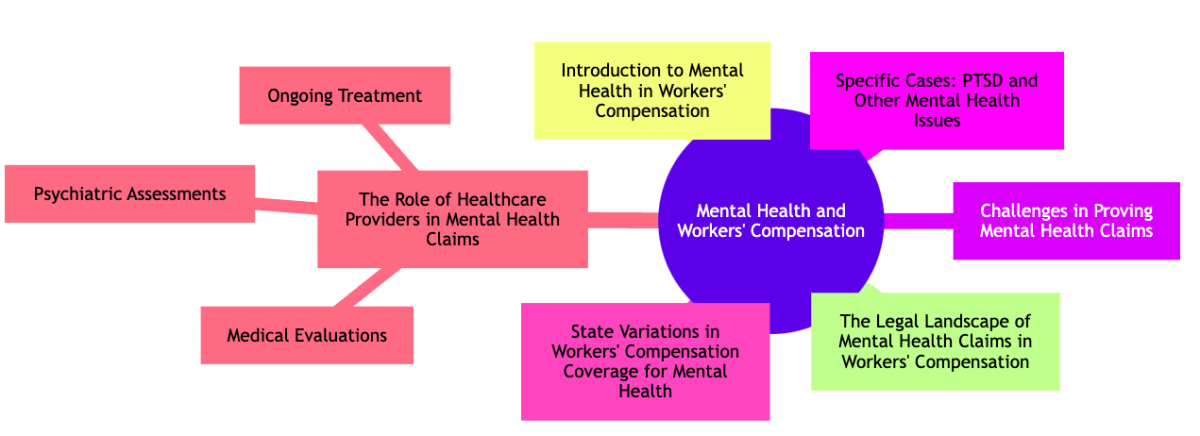Introduction to Mental Health in Workers' Compensation
In Pennsylvania, the intricacies of workers' compensation laws include specific provisions for mental health claims, reflecting the state's growing recognition of mental well-being in the workplace. This article aims to provide Pennsylvania employees and employers with crucial insights into these provisions. We will discuss the types of mental health issues covered, the process for filing claims, consulting with a worker's compensation attorney, and the legal criteria for establishing a work-related mental health condition. Understanding these Pennsylvania-specific rules is essential for effectively navigating and utilizing the workers' compensation system for mental health claims.
Key Takeaways
- Mental health claims are a growing focus in Pennsylvania's workers' compensation system.
- Proving a mental health claim's work-relatedness can be challenging but is essential.
- Documentation and medical evidence play key roles in substantiating claims.
- Pennsylvania's legal framework offers specific protections and avenues for claims.
- Understanding your rights is crucial for a successful mental health claim in workers' compensation.

The Legal Landscape of Mental Health Claims in Workers' Compensation
Pennsylvania's legal framework for mental health claims in workers' compensation is multifaceted and detailed. It acknowledges the complexity of mental health issues in the workplace and provides various avenues for employees to file claims. Key elements include the recognition of different types of psychological claims (Physical-Mental, Mental-Physical, Mental-Mental), the need for substantial evidence linking the mental health issue to workplace conditions, and the provision for compensation in cases where these criteria are met.
Below is a table summarizing the key legal provisions for mental health claims in workers' compensation in Pennsylvania:
|
Aspect |
Pennsylvania |
Additional State Comparison |
|
Types of Psychological Claims |
- Physical-Mental - Mental-Physical - Mental-Mental |
Varies by state. Some states may not recognize certain types of psychological claims, especially Mental-Mental claims. |
|
Eligibility Criteria |
- Employment relationship - Injury occurred in and related to employment - Documentation of mental health issues |
Criteria may differ in other states, with some requiring more stringent proof of the injury’s work-relatedness. |
|
Evidence Requirements |
- Medical expert testimony - Documentation linking conditions to the workplace |
Other states might have different standards for medical evidence and documentation requirements. |
|
Claim Process |
- Reporting the injury - Filing a claim with details of the mental health issue |
Claim processes can vary, with some states having more complex or streamlined procedures. |
|
Compensation and Benefits |
- Medical treatment coverage - Disability benefits - Rehabilitation services |
The extent and type of compensation and benefits can differ, with some states offering more comprehensive coverage. |
|
Unique State Challenges |
- Proving 'abnormal working conditions' for Mental-Mental claims - Establishing a direct link between workplace and mental health issues |
Challenges in other states may include differing definitions of what constitutes a work-related mental health issue. |
Challenges in Proving Mental Health Claims
Proving a mental health claim in workers' compensation is a task fraught with complexities. The central challenge lies in demonstrating the direct connection between the workplace and the mental health issue. This process demands thorough documentation and often hinges on detailed medical evidence. The second paragraph should delve deeper into the importance of medical documentation, highlighting how it can make or break a claim. Medical assessments, consistent treatment records, and expert testimonies are invaluable in clearly portraying the claim's legitimacy.
Specific Cases: PTSD and Other Mental Health Issues
Post-traumatic stress disorder (PTSD) and other mental health issues are increasingly recognized in workers' compensation claims. These conditions, often resulting from high-stress or traumatic events at work, can have profound impacts on an employee's life and workability. For instance, PTSD is commonly seen in first responders, healthcare professionals, and employees who have experienced workplace violence or accidents.
- PTSD from witnessing or experiencing traumatic events
- Depression due to workplace bullying or harassment
- Anxiety disorders triggered by work-related stress
- Adjustment disorders following significant workplace changes
- Burnout syndrome from prolonged stress or overwork
State Variations in Workers' Compensation Coverage for Mental Health
Pennsylvania's approach to workers' compensation for mental health includes specific provisions for psychological claims. The state recognizes three types of psychological claims under workers' compensation: Physical-Mental, Mental-Physical, and Mental-Mental claims. These categories highlight the state's understanding of the various ways in which work can impact mental health.
1. Pennsylvania: The state acknowledges different types of psychological claims, such as when a physical event at work leads to a mental injury (Physical-Mental), mental distress resulting in physical injuries (Mental-Physical), and mental injuries due to psychological trauma in the workplace without any physical injury (Mental-Mental). Pennsylvania is unique in recognizing Mental-Mental claims, a category not universally accepted in other states.
2. New York: New York is advancing in its approach to mental injury benefits for workers. A bill passed by the New York Senate aims to expand workers' compensation mental injury benefits to all workers who suffer from extraordinary stress. This marks a significant shift, as the state previously had more restrictive rules around work-related stress claims. In New York, proving work-related stress leading to severe mental health issues like anxiety and depression is complex, requiring extensive medical documentation and often specific circumstances, such as a traumatic event at the workplace or extreme adverse working conditions.
The Role of Healthcare Providers in Mental Health Claims
Healthcare providers are key in mental health workers' compensation claims. They diagnose, document, and treat mental health conditions, offering crucial evidence for the claim. Their expertise ensures an accurate representation of the condition's work-relatedness.
Medical Evaluations
Medical evaluations are essential in workers' compensation claims for mental health. They provide an impartial assessment of the mental condition and its link to the workplace. This objective evidence is crucial for validating the claim.
Psychiatric Assessments
Psychiatric assessments offer a deep dive into an employee's mental state, crucial for workers' compensation claims. These thorough evaluations by specialists link mental health issues directly to work environments, aiding claim substantiation.
Ongoing Treatment
Ongoing treatment is vital in demonstrating the severity and persistence of mental health issues in workers' compensation claims. Continuous care and updates from healthcare providers underscore the claim's legitimacy and the need for sustained support.
Conclusion: Empowering Workers for Mental Health Advocacy
Understanding your rights in the realm of workers' compensation and mental health is more than just legal knowledge - it's a step toward empowerment. Navigating these claims can be daunting, but with the right information and support, workers can effectively advocate for their mental well-being. Pennsylvania's legal framework, while complex, offers avenues for employees to seek the help and compensation they deserve. Remember, mental health is as crucial as physical health, and safeguarding it is essential for a balanced work life.
RG INJURY LAW stands as a pillar of support in this journey. Their expertise in navigating the intricate paths of workers' compensation law ensures that your rights are acknowledged and actively defended. They are more than legal advisors; they are advocates committed to empowering workers in Pennsylvania to stand up for their mental health rights in the workplace.





















